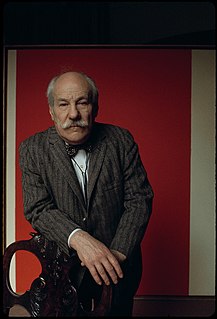A Quote by Ralph Waldo Emerson
Our culture, therefore, must not omit the arming of the man. Let him hear in season, that he is born into the state of war, and that the commonwealth and his own well-being require that he should not go dancing in the weeds of peace, but warned, self- collected, and neither defying nor dreading the thunder, let him take both reputation and life in his hand, and, with perfect urbanity, dare the gibbet and the mob by the absolute truth of his speech, and the rectitude of his behaviour.
Quote Topics
Absolute
Absolute Truth
Behaviour
Being
Born
Both
Collected
Commonwealth
Culture
Dancing
Dare
Defying
Go
Hand
He Man
Hear
Him
His
Life
Man
Mob
Must
Neither
Nor
Our
Own
Peace
Perfect
Rectitude
Reputation
Require
Season
Self
Should
Speech
State
Take
Therefore
Thunder
Truth
War
Warned
Weeds
Well
Well-Being
Related Quotes
What men and women need is encouragement. Their natural resisting powers should be strengthened, not weakened ... Instead of always harping on a man's faults, tell him of his virtues. Try to pull him out of his rut ... Hold up to him his better self, his real self that can dare and do and win out! ... People radiate what is in their minds and in their hearts.
Were I to go down into the market-place, armed with the powers of witchcraft, and take a peasant by the shoulders and whisper to him, 'In your lifetime, have you known peace?' wait for his answer, shake his shoulders and transform him into his father, and ask him the same question, and transform him in his turn to his father, I would never hear the word 'Yes,' if I carried my questioning of the dead back for a thousand years. I would always hear, 'No, there was fear, there were our enemies without, our rulers within, there was prison, there was torture, there was violent death.
Man—every man—is an end in himself, not a means to the ends of others; he must live for his own sake, neither sacrificing himself to others nor sacrificing others to himself; he must work for his rational self-interest, with the achievement of his own happiness as the highest moral purpose of his life.
When a man is just and firm in his purpose,
The citizens burning to approve a wrong
Or the frowning looks of a tyrant
Do not shake his fixed mind, nor the Southwind.
Wild lord of the uneasy Adriatic,
Nor the thunder in the mighty hand of Jove:
Should the heavens crack and tumble down,
As the ruins crushed him he would not fear.
And he began to see the truth, that Ged had neither lost nor won but, naming the shadow of his death with his own name, had made himself whole: a man who, knowing his whole true self, cannot be used or possessed by any power other than himself, and whose life therefore is lived for life's sake and never in the service of ruin, or pain, or hatred, or the dark.
At first, man was enslaved by the gods. But he broke their chains. Then he was enslaved by the kings. But he broke their chains. He was enslaved by his birth, by his kin, by his race. But he broke their chains. He declared to all his brothers that a man has rights which neither god nor king nor other men can take away from him, no matter what their number, for his is the right of man, and there is no right on earth above this right. And he stood on the threshold of freedom for which the blood of the centuries behind him had been spilled.
The great object of Education should be commensurate with the object of life. It should be a moral one; to teach self-trust: to inspire the youthful man with an interest in himself; with a curiosity touching his own nature; to acquaint him with the resources of his mind, and to teach him that there is all his strength.
The things of the world are ever rising and falling, and in perpetual change; and this change must be according to the will of God, as He has bestowed upon man neither the wisdom nor the power to enable him to check it. The great lesson in these things is, that man must strengthen himself doubly at such times to fulfill his duty and to do what is right, and must seek his happiness and inward peace from objects which cannot be taken away from him.
The believer is sensible of his infirmities, for it is supposed that he is wrestling under them. He sees, he feels, that he is not man enough for his work; that his own hands are not sufficient for him, nor his own back for his burden; this is what drives him out of himself to the grace that is in Christ Jesus. And thus he lies open to the help of the Spirit, while proud nature in unbelievers is left helpless.







































